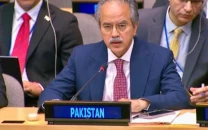Behind closed doors: The violence that the law is silent on
ICT domestic violence bill draft remains weak, PPC needs to be updated.

ICT domestic violence bill draft remains weak, PPC needs to be updated. PHOTO: ONLINE
The Pakistan Penal Code does not even cover domestic violence, making attempts to seek redress cumbersome for victims as they have to pass through the procedural rigours of the penal code.
The situation requires separate legislation.
While the provinces of Sindh and Khyber-Pakhtunkhwa have passed their respective bills, Islamabad Capital Territory’s Domestic Violence Bill (DVB) still remains a weak draft.
In a country where domestic violence is largely considered a private affair, the need for legislation on this count becomes even greater, according to Lahore-based lawyer Saad Rasool.
Meanwhile, data compiled by Aurat Foundation and other women’s rights NGOs shows that crimes against women such as burning incidents, acid throwing, domestic violence and murder have risen at an alarming rate over the last decade.
The Sindh government passed its DVB on March 8, 2013, followed soon after by Khyber Pakhtunkhwa (K-P).
However the Islamabad Capital Territory (ICT) bill is still pending. It is currently being revised by a legal consultant at the National Commission on Status of Women (NCSW).
“The biggest hurdle is lack of political will and commitment to gender justice” rights activist Tahira Abdullah told The Express Tribune. However, she cautiously added, “I will not speculate on the current government’s intentions. Let us see how the revised DVB is treated once the women parliamentarians table it in the National Assembly”.
On revision of the bill, Abdullah said the statement of objects and reasons of the bill is weak and needs strengthening. The punishments --- fines and imprisonment --- are far too low and need enhancement in order to serve as credible deterrents.
In addition, she said that since the federal ministry of women development has been devolved and abolished, there was a need for the inclusion of a focal ministry or a government body to implement the law once it is enacted. Moreover, she said there is a need to bring draft ICT DVB at par with the Sindh DVB.
Rasool said that there is no specific law in the PPC that covers domestic violence. Therefore the cases are tried under sections relating to assault or wrongful confinement.
He further explained that because of the absence of a specific law, cases go through a lengthy and cumbersome process under family courts, and even that happens only after a first information report (FIR) has been registered with the police station. Unfortunately, the police treat domestic violence as an internal matter of the household and women face difficulties in getting FIRs registered.
“In the ICT bill, protections must be built in for specific punishments, shortened timeline for case disposal and most importantly, protection of the victim during proceedings,” he said.
“Moreover, special facilitation for domestic violence cases and streamlining how DV cases are registered must be ensured.”
Published in The Express Tribune, January 27th, 2014.



















COMMENTS
Comments are moderated and generally will be posted if they are on-topic and not abusive.
For more information, please see our Comments FAQ